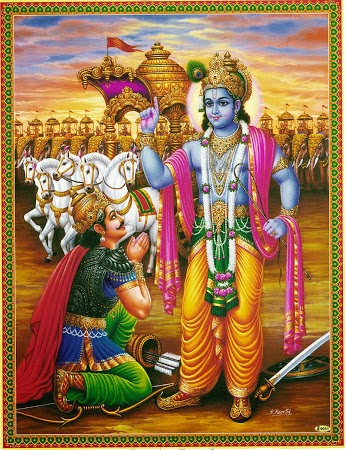Gita : Ch-4. Slo-39.
( Vey important slokam )
Srimad Bhagavad-Gita :
Chapter-4. ( Jnana-karma-sanyasa-yogam )
Slokam-39. The topic in this slokam is :- { Niscitopayam [ ( Decided/ Judged ) + ( way /trick to achieve/achieve goal ) ] } for Jnanaarjjanam ( achieve/ gain/earn+ Knowledge ).
sradhavaan labate jnanam tatparah samyatendriyah,
jnanam labddva paraam santimacirennaadhigacchati.
tatparah = Interested in Paramatma tattvam,
samyatendriyah = Control Indriyas as necessary,
sradhavaan = The concentated (wise ) man,
jnanam labate = Achieve, Atmajnanam ( knowledge of self ).
jnanam labddva = Once gained Jnanam,
acirenna = Without delay,
paraam santim = The Supreme Peace,
adhigachati = ( is ) Attained.
If one ( seeker ) wants to gain Atmajnanam, necessary three gunas ( qualities / characters ) for those Sadhakas (seekers) : told in this slokam. Those seekers who think that their sadhana is the sincere and honest, still do not reach the target ( attain the goal ). The words Sradhavan, Tatparah, Samyatendriyah indicate the three gunas, and without these three gunas, one cannot discard physical /materialistic relationships, thereafter fail to the divine heights. But many ( majority persons ) misunderstand the meaning of these important words, the three gunas.
1. Sradha-( faith) : Devotees who have doubts in their Spiritual problems are exploited by un-real ( fraud ) gurus ( spiritual teachers/ guides ) : using the word Sradha. These devotees believe blindly, (without any question ) accept the so called (frauds ) gurus , and take their statements as true. They (devotees) misunderstand, thus think this way of belief is the Sradha, by surrendering their mind and intelligence to these frauds, sometime devotees become religious fanatics too.
"The capacity of the buddhi (intelligence) to grasp correctly the essence of the Sastras, and teachings of the true Guru is known as 'SRADHA'. This removes the above wrong notion about sradha".
2. Tatparah :- For the development of self ( atma ) choose any route, but Sadhaka must march in that path with confident mind and steady intelligence.You cannot purify your inner, by mere intelligent study only. You must have TATPARAH ( interest ) in the way of life as defined in the Upanishads.
3. Samyatendriyah : - One cannot develop "SRADHA AND TATPARAH" without the samyamanam (control) on his own indriyas. Indriyas ( sense-organs ) draw our attention to worldly pleasure giving objects. Once you fall into the trap of these sensuous pleasures, then your grip will not be firm in the higher values of life. Until unless you come out of the dirty waters of sensuous pleasures you cannot walk through the divine path. Divine values and sensuous pleasures are opposite poles. When one is present the other will not be there, like darkness moves away if you bring light there. Hence it is inevitable for a seeker to practise and follow 'Indriya-samyamanam' ( self-control of sense-organs).
Discard all 'Boghas' ( enjoyments ) of 'Vishayas ( sensuous objects ), then dedicate 'Sradha' (faith) in 'Dharma-Sastras', later life's target, the 'Supreme-Lakshyam'fixed always, carry on your business ( activity ) :- WHAT IS THE NEED OF THIS ???
Normally, Buddhi ( intelligence ) can function in the limits of karya-karana ( cause and effect) relationships only. In the beginning of Atma-vikasa seeker can function in the field of buddhi only. Hence he, ( the seeker ) will search / enquire, naturally about the fruit/result of this 'Tyagam' (sacrifice). The second part of this slokam provides the answer for it.
One who is 1.Sradhavan, 2. Tatparan, and 3. Samyatendriyan, will attain "JNANAM", Rishies confirm this to the seeker. What is the use of Jnanam? Lord Krishna declares : With Jnanam soon in great speed attains the 'SUPREME PEACE'. For this no time limits given. As in the last slokam ( 38 ), it is said "KALENA" meaning 'at suitable time', likewise, here, Lord says "Acirenna" meaning not later ( soon ).
Paraam-santhi :- The imperishable supreme peace is the life's lakshyam. Today Peace and samaadhanam are considered as business-goods, and in its name war preparations are done. In this situation truly we doubt about the "Lakshyam" indicated in this slokam. It is this term 'SANTHI', used repeatedly by all politicians, according to their conveniences/ gains. But we are not talking about the politician's santhi ( which is not clear and real), but it includes psychological impressions too.
It is true all living things do karmam, to fulfil their desires. Starting from breathing and eating, wars, riots, all efforts to become super-powers, human beings do this due to greed and desires only. Not only human, but also, in the animal and plant kingdoms too. In short until unless the inner motive for happiness is not there, till such time no karmam will be there.
Thus, through out the world, to gain highest happiness and to sustain it, if the effort is such, then "Life's Lakshyam will be, certainly Paramanandam ( peak of joy )only. The desire for happiness invents the 'SANGALPAS'. It is expressed in the form of karmas ( in the outer world ) in our day to day life. When we get paramanandam mind becomes tension less, and our body is relaxed. Therefore, the PARAM-ANANDAM IS SURELY PEACE ONLY. NO DOUBT ABOUT THIS !!!
To be continued ....





Comments
Post a Comment